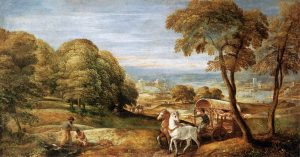Thoughts on Sunday’s Lessons for May 2, 2021
First Reading: Acts 8:26-40
The sweet, funny story of Philip and the Ethiopian eunuch in Acts carried a powerful message to the young church a few generations after Jesus: This church is open to all, no matter who you are. Joining the community through baptism is as easy as asking for it.

The Baptism of the Ethiopian Eunuch by the Deacon Philip (c.1545-1550), oil painting on canvas by Lambert Sustris (1515-1584). The Louvre, Paris. (Click image to enlarge.)
This assuring message carries through all of Sunday’s readings: God’s abiding love is open to all humankind. It showers on us as a free gift. In the Acts reading we see that even an Ethiopian – a foreigner from a strange land and a eunuch as well, barred from Judaism because his physical condition renders him biblically unclean – is welcome as an equal. So with joy, just like that, Philip baptizes him as one of us.
Psalm: Psalm 22:24-30
Sunday’s Psalm portion, the ending verses of the Psalm that immediately precedes the beloved 23rd, rings out as a traditional hymn of praise. Its clear message resonates with Philip’s warm welcome to the Ethiopian eunuch: God is the ruler of all nations, all the world, those already born and all those yet to come. We live for God, the Psalmist sings. We serve God, we praise God, and we fulfill our vow to God by making sure that the poor are cared for and the hungry are fed.
Second Reading: 1 John 4:7-21
These verses selected for Sunday’s second reading echo and expand upon John the Evangelist’s memorable words, “As the Father has loved me, so I have loved you … love one another as I have loved you.” Indeed, we will hear that passage in next week’s Gospel, showing the interconnected nature of the readings for Eastertide. It is tempting to bask in the warm assurance that God loves us, but bear in mind that we are called to action too: “Love one another” is not just a suggestion: It is a covenant. If we can’t love our brothers and sisters, how can we make room in our hearts for God?
Gospel: John 15:1-8
In a noteworthy aspect of John’s Gospel, he attributes seven “I am” quotes to Jesus in which, according to John, Jesus offers striking metaphors to explain his identity and mission: I am the bread of life, the light of the world, the door to salvation, the good shepherd, the resurrection and life, the way, the truth and the life, and now in Sunday’s Gospel, the true vine. Here we begin a series of Gospels from John’s account of Jesus’ long farewell to his disciples at the Last Supper. Jesus uses the vine and the vineyard as an extended metaphor. Describing vineyard practices that continues to this day, Jesus imagines God cutting out weak branches in order to make the vine strong and productive. If we do not abide in God as God abides in us, we risk being pruned and discarded like the weak vines. Abide in God through Jesus, though – live in God like a sturdy branch on a nurturing vine – and we will be strong and fruitful.
